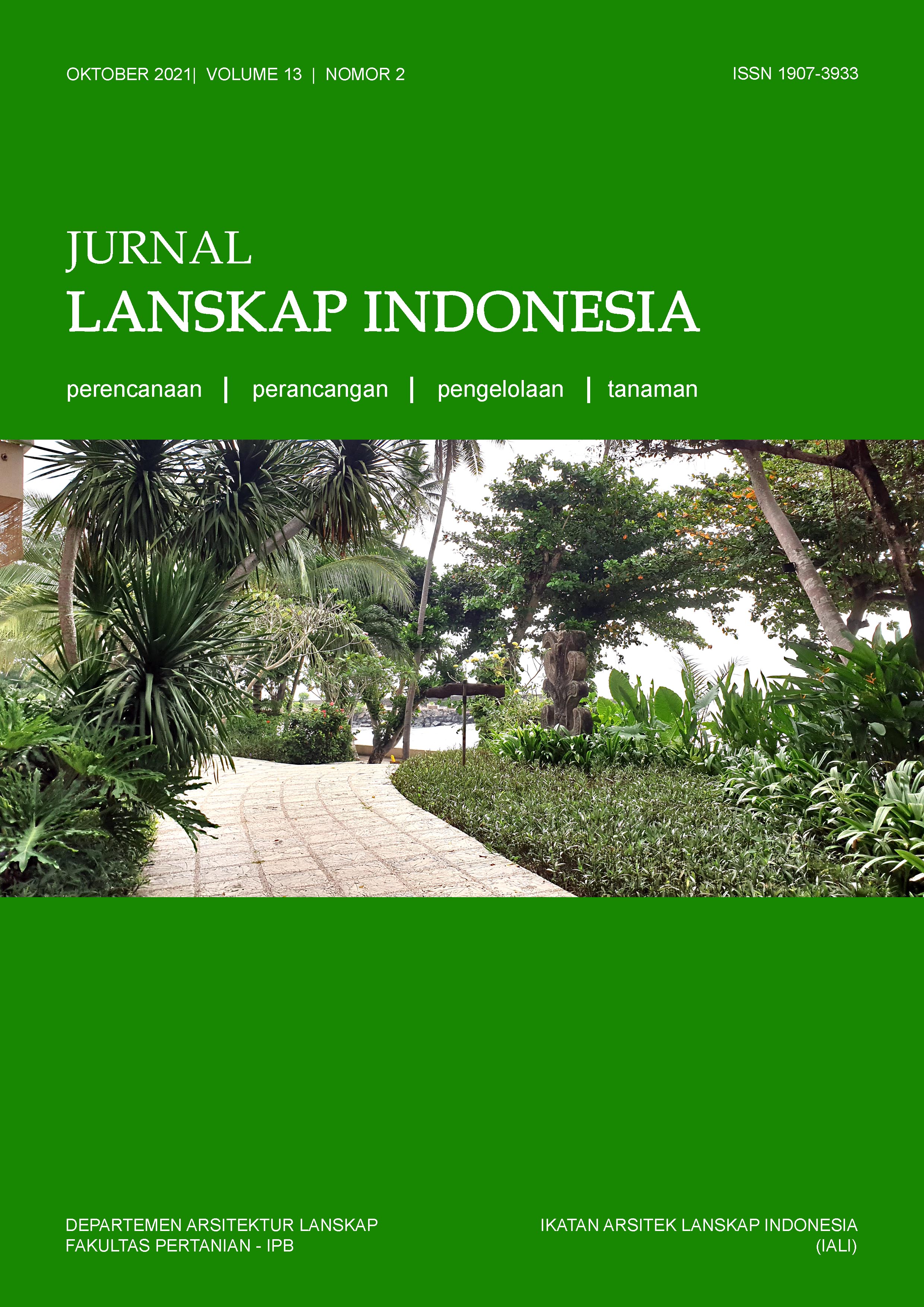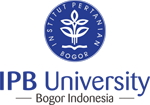Fungsi Hutan Kota: Korespondensi Motivasi Berkunjung dan Kegiatan
Abstract
The high intensity of urban activities tends to make people need to do recreational activities. One of the functions of the city forest is a recreational place to release the fatigue of the city community from the high intensity of social and economic activities. This research aims to uncover the relationship between the motivation of visiting and activities carried out in city forests based on people's preferences. Research is conducted through grounded theory approach with qualitative methods that are explosive. Data collection is done through the dissemination of open-ended and close-ended online questionnaires, as well as non-random sampling. The collected text data is analyzed with content analysis. The results of the analysis of motivational correspondence visited and this activity revealed two functions of the city forest, namely interactive tourism and educational tourism. Interactive tours are visitors come with motivation of the quality of the place, the activities carried out are affective and psychomotor. While educational tourism is a visitor comes with motivational information, the activities carried out are cognitive.
Keywords: city forests, activities, visiting motivations, preferences.
Downloads
References
Alfian, R., Kuniawan, H. 2010. Identifikasi Bentuk, Struktur, dan Peranan Hutan Kota Malabar Malang. Buana Sains, 10 (2), 195-201
Bachtiar, J. C. U., Kusuma, H. E. 2019. Pengelompokan Pengunjung Berdasarkan Durasi Kunjungan dan Karakteristik Taman: Relaksasi, Pelarian, dan Penikmat. Jurnal Lanskap Indonesia, 11(1), 11-16 DOI: https://doi.org/10.29244/jli.v11i1.24907
Berry, D. 1976. Preservation of Open Space and the Concept of Value. American Journal of Economics and Sociology, 35 (2), 113-124. United States: Wiley-Blackwell. DOI: https://doi.org/10.1111/j.1536-7150.1976.tb02985.x
Burton, R. 1995. Travel Geography. London: Pitman Publishing.
Creswell, J. W. 2007. Qualitative Inquiry and Research Design: Choosing among Five Approaches (2nd ed.). London: SAGE Publications
Corbin, J., Strauss, A. 2008. Basics of Qualitative Research: Techniques and Procedures for Developing Grounded Theory (3rd ed.). Thousand Oaks, CA: Sage. DOI: https://doi.org/10.4135/9781452230153
Fandeli, C., Kaharudin, Mukhlison. 2004. Perhutanan Kota. Fakultas Kehutanan Universitas Gadjah Mada: Yogyakarta.
Kementerian Pariwisata. 2009. Keputusan Menteri Nomor 10 Tahun 2009 tentang Kepariwisataan.
Lestari, R. A., Jaya, I. N. S. 2005. Penggunaan Teknologi Penginderaan Jauh Satelit dan SIG untuk Menentukan Luas Hutan Kota: (Studi Kasus di Kota Bogor, Jawa Barat). Jurnal Manajemen Hutan Tropika 11 (2), 56-69
Najafi, Shariff. 2011. The Concept of Place and Sense of Place in Architectural Studies. World Academy of Science, Engineering and Technology 56, 1100-1106
Pemerintah Republik Indonesia. 2002. Peraturan Pemerintah Republik Indonesia Nomor 63 Tahun 2002 tentang Hutan Kota
Pemerintah Republik Indonesia. 2005. Undang-Undang Republik Indonesia Nomor 3 Tahun 2005 tentang Sistem Keolahragaan Nasional.
Permata, N. D, Syartinilia, Munandar, A. 2018. Pemanfaatan Hutan Kota di Wilayah Jakarta Timur Sebagai Kawasan Rekreasi Masyarakat Kota. Jurnal Lanskap Indonesia, 10 (2), 47-55 DOI: https://doi.org/10.29244/jli.2018.10.2.47-55
Prastiyo, Y. B., Kaswanto, R. L., Arifin, H. S. 2020. Plants Diversity of Agroforestry System in Ciliwung Riparian Landscape, Bogor Municipality. IOP Conference Series: Earth and Environmental Science, 477, 012024. https://doi.org/10.1088/1755-1315/477/1/012024 DOI: https://doi.org/10.1088/1755-1315/477/1/012024
Subarudi, Samsoedin, I., Sylviani, Syahadat, E., Ariawan, K., Suryandari, E. Y., dan Panjaitan, J. H. 2014. Sintesis Penelitian Integratif Pengembangan Hutan Kota pada Lanskap Perkotaan. Bogor. Kementerian Lingkungan Hidup dan Kehutanan
Van den Berg, A. E., Maas, J., Verheij, R. A, Groenewegen, P. P. 2010. Green Space as A Buffer Between Stressful Life Events and Health. Soc Sci Med, 70(8), 1203−1210 DOI: https://doi.org/10.1016/j.socscimed.2010.01.002
Copyright (c) 2021 Riyad Maulana, Annisa Safira Riska, Hanson Endra Kusuma

This work is licensed under a Creative Commons Attribution 4.0 International License.
This journal permits and encourages authors to post items submitted to the journal on personal websites or institutional repositories both prior to and after publication, while providing bibliographic details that credit, if applicable, its publication in this journal. However, after the article is submitted and published in this journal, it is fully copyrighted by the Jurnal Lanskap Indonesia or JLI. If excerpts from other copyrighted works are included, the author must obtain written permission from the copyright owner and give credit to the source in the article. Then, the writer or reader is allowed to copy, share, and redistribute articles/material in any form. But it must still include the appropriate source and credit because the article in this journal is licensed by Creative Commons Attribution 4.0 International License (CC BY 4.0).
I. Proposed Policy for Journals That Offer Open Access
Authors who publish with this journal agree to the following terms:
- Authors retain copyright and grant the journal right of first publication with the work simultaneously licensed under a Creative Commons Attribution License that allows others to share the work with an acknowledgement of the work's authorship and initial publication in this journal.
- Authors are able to enter into separate, additional contractual arrangements for the non-exclusive distribution of the journal's published version of the work (e.g., post it to an institutional repository or publish it in a book), with an acknowledgement of its initial publication in this journal.
- Authors are permitted and encouraged to post their work online (e.g., in institutional repositories or on their website) prior to and during the submission process, as it can lead to productive exchanges, as well as earlier and greater citation of published work (See The Effect of Open Access).
II. Proposed Policy for Journals That Offer Delayed Open Access
Authors who publish with this journal agree to the following terms:
- Authors retain copyright and grant the journal right of first publication, with the work after publication simultaneously licensed under a Creative Commons Attribution License that allows others to share the work with an acknowledgement of the work's authorship and initial publication in this journal.
- Authors are able to enter into separate, additional contractual arrangements for the non-exclusive distribution of the journal's published version of the work (e.g., post it to an institutional repository or publish it in a book), with an acknowledgement of its initial publication in this journal.
- Authors are permitted and encouraged to post their work online (e.g., in institutional repositories or on their website) prior to and during the submission process, as it can lead to productive exchanges, as well as earlier and greater citation of published work (See The Effect of Open Access).



























